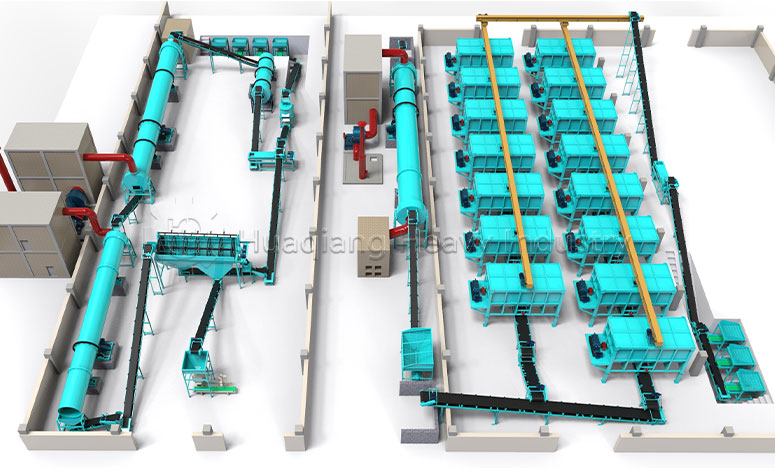From Waste to Wonder: How Fertilizer Equipment Transforms Trash into Treasure?
In today’s pursuit of sustainable development, bio-organic fertilizer production lines are quietly revolutionizing the agricultural landscape. These innovative production systems not only integrate traditional composting wisdom but also combine modern fertilizer equipment to establish a complete, efficient, and environmentally friendly circular agricultural system.
The Amazing Journey of Transformation
Imagine this scene: in modern fertilizer production workshops, various agricultural wastes embark on their transformation journey. Raw material pretreatment equipment takes the stage first, precisely crushing and mixing waste materials like crop straw and livestock manure, thoroughly preparing for the subsequent fermentation process. This pretreatment system works like a meticulous chef, blending various “ingredients” according to optimal ratios.
Then, large wheel compost turning machine and intelligent fermentation tanks operate in coordination. Under precisely controlled temperature, humidity, and ventilation conditions, microorganisms begin to work their magic. These invisible “craftsmen” work tirelessly day and night, transforming waste into nutrient-rich organic matter. This process not only inherits traditional composting techniques but also showcases the brilliance of modern biotechnology.
The Beauty of Precision Manufacturing
After fermentation completes, disc granulator demonstrate their exquisite craftsmanship. They shape the fermented materials into uniform pellets with consistent density, much like a skilled pastry chef ensuring every “product” meets standard requirements. These pellets then undergo drying and cooling processes, while screening equipment acts as a strict quality inspector, ensuring consistent final product quality.
Finally, automated packaging systems dress these “treasures” in suitable packaging, completing the magnificent transformation from waste to commodity. The entire process connects seamlessly like a meticulously orchestrated ecological symphony, with each环节 demonstrating the precision and wisdom of modern industry.
A Model of Circular Economy
The brilliance of this system lies in its profound circular concept. It perfectly illustrates the principle that “waste is just resources in the wrong place,” converting what would otherwise be environmental pollutants into precious resources that nourish the soil. Statistics show that a standard production line can process tens of thousands of tons of agricultural waste annually, reducing considerable carbon emissions.
Compared with chemical fertilizers, bio-organic fertilizers offer unique advantages. They not only release nutrients steadily and sustainably but also improve soil aggregate structure, enhancing the soil’s water and fertilizer retention capacity. More importantly, they provide an ideal living environment for soil microorganisms, promoting the prosperity of microbial communities and thus establishing a healthy soil ecosystem.
The Future Path of Green Agriculture
Standing by the fertile fields, watching thriving crops, we can’t help but reflect: aren’t these seemingly ordinary fertilizer pellets carrying our beautiful expectations for green agriculture? They are not just plant nutrients but also crucial bridges connecting modern agriculture with natural ecology.
In today’s world facing challenges like soil degradation and environmental pollution, this technological approach of converting waste into quality fertilizer appears particularly valuable. It not only addresses agricultural non-point source pollution but also creates considerable economic benefits, truly achieving a win-win situation for both ecological and economic outcomes.
Looking ahead, with continuous technological progress and innovation, bio-organic fertilizer production lines will become more intelligent and efficient. We anticipate seeing more such green factories established worldwide, contributing significantly to global food security and ecological safety.
